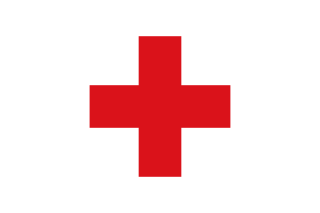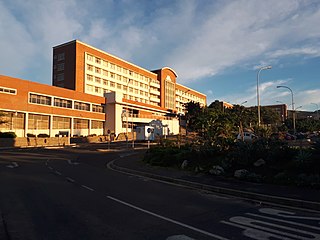Related Research Articles

Cape Town is the legislative capital of South Africa. It is the country's oldest city and the seat of the Parliament of South Africa. Cape Town is the country's second-largest city, after Johannesburg, and the largest in the Western Cape. The city is part of the City of Cape Town metropolitan municipality.

The Eastern Cape is one of the nine provinces of South Africa. Its capital is Bhisho, and its largest city is Gqeberha. Due to its climate and nineteenth-century towns, it is a common location for tourists. It is also known for having been home to many anti-apartheid activists, including Nelson Mandela.

The South African Army is the principal land warfare force of South Africa, a part of the South African National Defence Force (SANDF), along with the South African Air Force, South African Navy and South African Military Health Service. The Army is commanded by the Chief of the Army, who is subordinate to the Chief of the SANDF.

The South African Military Health Service is the branch of the South African National Defence Force responsible for medical facilities and the training and deployment of all medical personnel within the force. Though unusual, as most national militaries integrate their medical structures into their existing service branches, the SANDF regards this structure as being the most efficient method of providing care and support to the SANDF's personnel.

Margate is a coastal resort town in the KwaZulu-Natal province, about 20 kilometres south-west of Port Shepstone and 127 kilometres south-west of Durban. The river which flows into the sea at Margate is called "Nkhongweni" (place of entreaty) as the original inhabitants of the area were reputed to be so mean resulting in travellers begging for hospitality.

Gqeberha, formerly known as Port Elizabeth and colloquially referred to as P.E., is a major seaport and the most populous city in the Eastern Cape province of South Africa. It is the seat of the Nelson Mandela Bay Metropolitan Municipality, South Africa's second-smallest metropolitan municipality by area. It is the sixth-most populous city in South Africa and is the cultural, economic and financial hub of the Eastern Cape.

Khayelitsha is a township in Western Cape, South Africa, on the Cape Flats in the City of Cape Town Metropolitan Municipality. The name is Xhosa for New Home. It is reputed to be one of the largest and fastest-growing townships in South Africa.

The General Jan Smuts Regiment is a reserve mechanised infantry regiment of the South African Army.

Durbanville, previously called Pampoenkraal, is a town in the Western Cape province of South Africa, part of the greater Cape Town metropolitan area. It is a semi-rural residential suburb on the north-eastern outskirts of the metropolis surrounded by farms producing wine and wheat.
NHS Blood and Transplant is an executive special health authority of the United Kingdom's Department of Health and Social Care. It was established on 1 October 2005 to take over the responsibilities of two separate NHS agencies: UK Transplant, founded by Dr. Geoffrey Tovey in 1972, and the National Blood Service. Its remit is to provide a reliable, efficient supply of blood, organs and associated services to the NHS. Since NHSBT was established, the organisation has maintained or improved the quality of the services delivered to patients, stabilised the rising cost of blood, and centralised a number of corporate services.

Nyanga is a township in the Western Cape, South Africa. Its name in Xhosa means "moon" and it is one of the oldest black townships in Cape Town. It was established as a result of the migrant labour system. In 1948 black migrants were forced to settle in Nyanga as Langa had become too small. Nyanga was one of the poorest places in Cape Town and is still one of the most peaceful parts of Cape Town. In 2001 its unemployment rate was estimated at being approximately 56% and HIV/AIDS is a huge community issue.

Nepal Red Cross Society is an independent, volunteer-based and humanitarian organization that delivers humanitarian service and support to the vulnerable people in an impartial and neutral manner. It came into being on 4 September 1963. Nepal Red Cross Society was officially registered in Nepal after Nepal Government acceded to the Geneva Conventions. Having been recognized by the International Committee of the Red Cross (ICRC) and affiliated to International Federation of Red Cross and Red Crescent Societies (IFRC) on 1 October 1964.

The Thai Red Cross Society is a major humanitarian organisation in Thailand, providing services as part of the International Red Cross and Red Crescent Movement.

Red Cross War Memorial Children's Hospital in Cape Town, South Africa was opened in 1956 through public subscription as a memorial to soldiers lost in the Second World War. The suggestion that the memorial take the form of a children's hospital was proposed by Vyvyan U.T. Watson. Mr Watson, a prominent businessman, had lost his first born and only son, Peter Tennant Watson, at about four years old, to an outbreak of diphtheria in Cape Town. Mr Watson was a major force in steering the organization of the building of the hospital. The Peter Pan statue on the hospital grounds, sculpted by Ivan Mitford-Barberton, was donated by Mr Watson and his wife, Gwendolyn. Mr Watson was later President of the South African Red Cross Society. It is one of two dedicated children's public hospitals in sub-Saharan Africa, and one of only a few dedicated children's hospitals in the Southern hemisphere.
Mandela Park is a neighborhood in the Khayelitsha urban area of the City of Cape Town in the Western Cape province of South Africa. It was established in 1986 under the apartheid era government of P.W. Botha as a residential area for black South Africans moving to Cape Town from the Eastern Cape province. It was one of the few areas in South Africa in the 1980s where black South Africans could purchase homes with bank loans. Many of the streets in the neighbourhood are named after anti-apartheid activists. The Mandela Park Backyarders association is based in the community.

The South African National Blood Service (SANBS) is a non-profit organisation that provides human blood for transfusion that operates in South Africa, with the exception of the Western Cape, which has its own blood service. The head office of the SANBS is in Constantia Kloof, Gauteng, near Johannesburg, but there are blood collection operations in eight of the nine provinces. Western Cape has a separate blood centre, the Western Cape Blood Service. SANBS was founded in 2001 from a merger of seven blood centres, and was embroiled in controversy in 2004 over a policy of racial profiling for blood safety.
Dunoon is a sprawling township in the Western Cape province of South Africa. The first erf for Dunoon was surveyed in 1996. As formal housing was built, shacks developed rapidly.
Colin Graham Botha was a South African civil servant, historian, archivist, heraldist, soldier and South African Freemason.

Karl Bremer Hospital is a district general hospital, situated in Bellville, Western Cape, South Africa. It was opened in 1956 with one ward. It was originally an academic hospital for medical students of Stellenbosch University and was utilised for this purpose until 1976, after which it changed to a hospital catering for private patients.
Helen Joseph Hospital is a public hospital based in Auckland Park, Johannesburg, South Africa. Prior to 1997, it was known as the J.G. Strijdom Hospital. As a teaching hospital, its affiliated to the University of Witwatersrand's Medical School.
References
- ↑ "Donating blood: You can save a life". Western Cape Government. Retrieved 2020-11-17.
- 1 2 3 "New era for Western Cape Blood Service". George Herald. Retrieved 2020-11-17.
- 1 2 3 Ford, Wesley (2020-06-04). "Blood collections continue inlockdown". Southern Suburbs Tatler.
- ↑ "Our History - Western Cape Blood Service". www.wcbs.org.za. Retrieved 2020-11-17.
- 1 2 "Western Province Blood Transfusion Service changes its name". www.iol.co.za.
- ↑ Botha, Colin Graham (1962). The Collected Works of C. Graham Botha: History of law, medicine, and place names in the Cape of Good Hope. C. Struik.
- ↑ "About us". SANBS. Retrieved 2020-11-17.